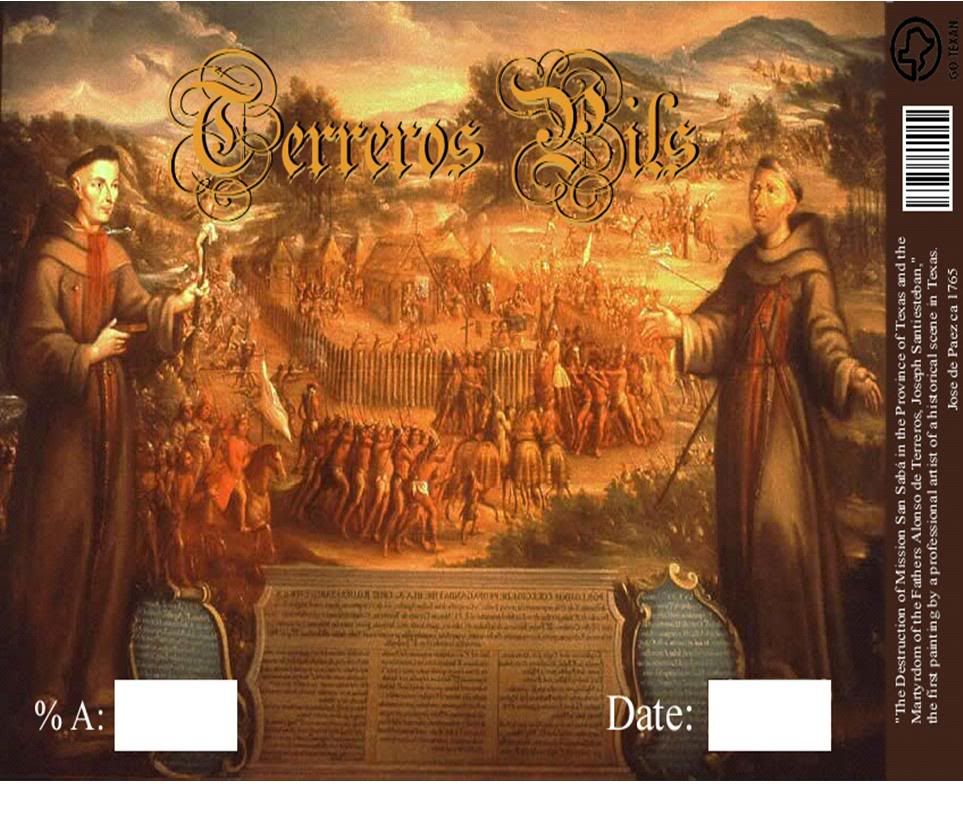goatchze
Well-Known Member
- Recipe Type
- All Grain
- Yeast
- Wyeast Bavarian Lager 2206
- Yeast Starter
- 1 Qt
- Additional Yeast or Yeast Starter
- none
- Batch Size (Gallons)
- 5
- Original Gravity
- 1.052
- Final Gravity
- 1.012
- Boiling Time (Minutes)
- 60
- IBU
- 32
- Color
- 3 SRM
- Primary Fermentation (# of Days & Temp)
- 14 @ 52F-35F
- Secondary Fermentation (# of Days & Temp)
- 28 @ 35F
- Additional Fermentation
- none
- Tasting Notes
- Crisp, clean pilsner
Terreros Pils
A dry, crisp, traditional pilsner named after a martyr and founder of Mission San Saba in 18th century Texas!

Ingredients
Grain
10 lb German Pilsner Malt
Hops
1 1/2 oz Halltertauer Hersbrucker (2.4%) - Boiled for 60 minutes
1 oz Halltertauer Hersbrucker (2.4%) - Boiled for 45minutes
1 oz Halltertauer Hersbrucker (2.4%) - Boiled for 30minutes
1 oz Halltertauer Hersbrucker (2.4%) - Boiled for 15 minutes
Water
Reverse Osmosis Water
Yeast
Wyeast Bavarian Lager 2206 in a 1 quart starter
Method
Step Mash with Batch Sparge
Protein Rest: 20 minutes @ 120-125F
Sacc. Rest: 60 minutes @ 152F
Mash Out: During Sparge @ 168F
Notes: The AAU for the hops is what is most important and 2.4% is quite low for a typical Hallertauer (but I bought several pounds of the stuff, so that's what I use!) If you've got 5% AA Hersbrucker hops, then cut the hop amounts in half.
The German pilsner malt that I use is undermodified, so a protein rest is extremely important. Without it clarity and taste will not be right. A protein rest alone allows me to produce clear beer (no irish moss or finings are used).
I normaly strike at 135F with 3 1/2 gallons of water or so to achieve the protein rest temperature. Boiling water is then added to raise the mash temperature to 152F (usually 1 to 1 1/2 gallons). This makes for a very thin mash so I usually go with either a single batch sparge w/ 2 gallons or two sparges at 1 gallon each. I haven't noticed a difference in efficiency between the two. Sparge water is at around 175-180F.
A dry, crisp, traditional pilsner named after a martyr and founder of Mission San Saba in 18th century Texas!

Ingredients
Grain
10 lb German Pilsner Malt
Hops
1 1/2 oz Halltertauer Hersbrucker (2.4%) - Boiled for 60 minutes
1 oz Halltertauer Hersbrucker (2.4%) - Boiled for 45minutes
1 oz Halltertauer Hersbrucker (2.4%) - Boiled for 30minutes
1 oz Halltertauer Hersbrucker (2.4%) - Boiled for 15 minutes
Water
Reverse Osmosis Water
Yeast
Wyeast Bavarian Lager 2206 in a 1 quart starter
Method
Step Mash with Batch Sparge
Protein Rest: 20 minutes @ 120-125F
Sacc. Rest: 60 minutes @ 152F
Mash Out: During Sparge @ 168F
Notes: The AAU for the hops is what is most important and 2.4% is quite low for a typical Hallertauer (but I bought several pounds of the stuff, so that's what I use!) If you've got 5% AA Hersbrucker hops, then cut the hop amounts in half.
The German pilsner malt that I use is undermodified, so a protein rest is extremely important. Without it clarity and taste will not be right. A protein rest alone allows me to produce clear beer (no irish moss or finings are used).
I normaly strike at 135F with 3 1/2 gallons of water or so to achieve the protein rest temperature. Boiling water is then added to raise the mash temperature to 152F (usually 1 to 1 1/2 gallons). This makes for a very thin mash so I usually go with either a single batch sparge w/ 2 gallons or two sparges at 1 gallon each. I haven't noticed a difference in efficiency between the two. Sparge water is at around 175-180F.


